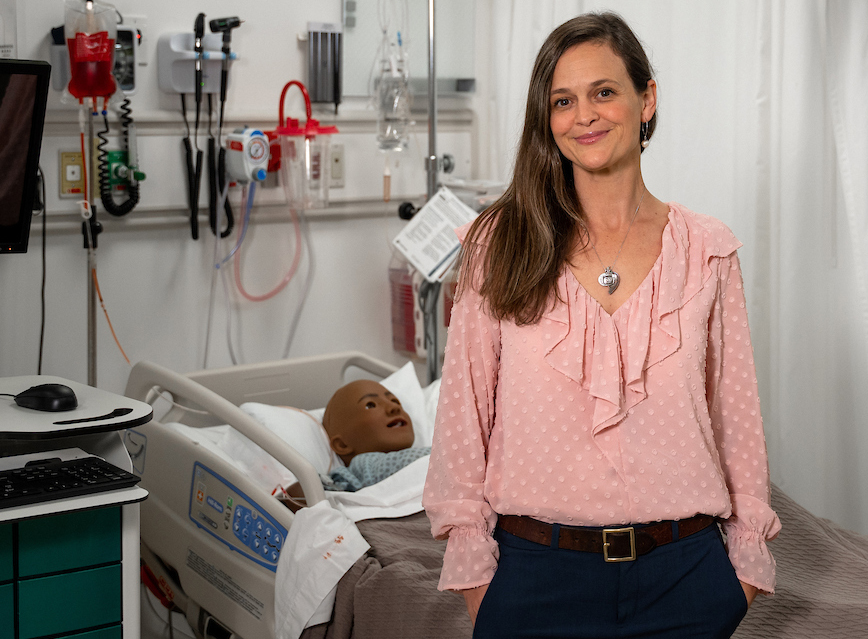Memphis, Tenn. – Tara Jackson Lemoine, DO, has been named the new executive director for the Center for Health Care Improvement and Patient Simulation (CHIPS) at the University of Tennessee Health Science Center.
Dr. Lemoine joined UTHSC to lead the Center for Healthcare Improvement and Patient Simulation, a nearly $40 million simulation building that opened in 2018 on the Memphis campus, as much for the state-of-the-art facility, as for the outstanding staff members who operate it.
“The building is beautiful, and it is a standout, but I think the people inside it, the simulation experts who are a part of this program, are the people who set the standard for what health care simulation is in this country,” Dr. Lemoine said. “So, it is not just being able to work in the building itself, it is the core CHIPS simulation team who really are the impetus for me being here. Additionally, the commitment of the senior campus leadership to simulation and their clear understanding of its value in education and the impact it has on health care, were the drivers for me joining CHIPS.”
Dr. Lemoine comes to UTHSC from Valley Children’s Hospital in Madera, California. She is dual board-certified in pediatrics and pediatric critical care. After receiving her Doctor of Osteopathy degree from North Texas Health Science Center, she completed her residency and critical care fellowship at Primary Children’s Medical Center and the University of Utah. She obtained a fellowship in simulation medicine through the University of Calgary in Alberta, Canada.
“I fell in love with simulation because my clinical background in pediatric critical care is a high-acuity, fast-paced, procedurally heavy, team-based field of medicine,” Dr. Lemoine said. “And I was drawn to simulation because it helped secure, not only the required procedural skills to be an intensivist, but also the mastery of communication and interprofessional teamwork that is necessary to deliver high-quality safe patient care.”
Immediately prior to joining UTHSC, Dr. Lemoine spent 10 years building a simulation program at Valley Children’s Hospital. The medical director of simulation and the academic chief of resident and fellow simulation, she started with one simulation a month, growing the program into an interprofessional simulation program that reached throughout the hospital.
“Having a background in simulation medicine, as well as a clinical experience in the interprofessional world of not only training people and working alongside a team, this opportunity at UTHSC appealed to me because it’s one of the largest simulation centers in the country, certainly the only one of its kind in the state,” she said. She was also attracted to what she sees as the capacity to broaden the scope of simulation at UTHSC.
She acknowledged the work of Chad Epps, MD, the first executive director of CHIPS, who passed away in late 2020. “He was a formidable simulationist and was groundbreaking in the world of health care simulation,” Dr. Lemoine said. “To be able to follow in his footsteps is an honor, and hopefully, I will do justice to what it is that he was dreaming this to be one day, and I, like him, see that this is the key to patient safety and the future of training and education.”
In January, CHIPS received accreditation in Teaching/Education by the Society for Simulation in Healthcare (SSH) and the Council for Accreditation of Healthcare Simulation Programs. SSH accreditation is a peer-reviewed, customized evaluation of health care simulation programs and signifies that CHIPS is delivering high-quality simulations to prepare clinicians for the diverse array of health care situations and procedures they will encounter in the patient-care setting.
As Tennessee’s only public, statewide, academic health system, the mission of the University of Tennessee Health Science Center is to bring the benefits of the health sciences to the achievement and maintenance of human health through education, research, scientific discovery, clinical care, and public service, with a focus on the citizens of Tennessee and the region. The main campus in Memphis includes six colleges: Dentistry, Graduate Health Sciences, Health Professions, Medicine, Nursing and Pharmacy. UTHSC also educates and trains medicine, pharmacy, and/or health professions students, as well as medical residents and fellows, at major sites in Knoxville, Chattanooga and Nashville. For more information, visit www.uthsc.edu. Find us on Facebook: facebook.com/uthsc, on Twitter: twitter.com/uthsc and on Instagram: instagram.com/uthsc.


